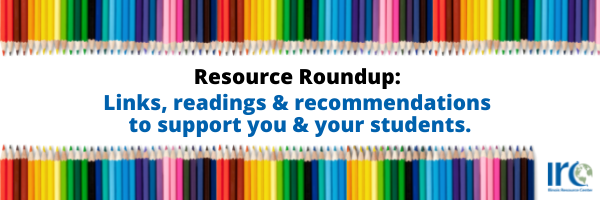This post is part of our ongoing “Language and Culture Lenses” series, where the IRC team discusses trends in education impacting our communities through language and cultural lenses, and how these conversations intersect with our vision of a world where every child’s languages and cultures are affirmed, every teacher’s practice is reflective and responsive, and every school’s systems and policies are inclusive and equitable. You can view the entire series here.
For years, libraries across the country and beyond have hosted drag story hours, events where drag performers in colorful attire read aloud to young children. Sometimes, the books have LGBTQ+ themes; often, they are stories with themes on self-love and acceptance, teaching kindness and self-expression, all empowering messages for children. As these events have grown in popularity, they have become a flashpoint for demonizing the LGBTQ+ community. Drag performers have been a target of verbal and physical violence, the venues that host drag events have been threatened and vandalized, and legislation to restrict drag has been proposed.
The notion that there is any sinister undercurrent to drag story hour programming is an outright lie manufactured to vilify a community. These attacks are particularly disheartening because drag story hours are such an uplifting celebration of the joy of reading. Drag performers offer a spirit of creativity and fun, sparking the imaginations of their audience at any age. When children see a drag queen at storytime, they see a person wearing a fun costume—that’s all.
It is also important to acknowledge that assaults on drag and family-friendly drag programming are fundamentally about fomenting fear of transgender and gender-non-conforming people, including trans kids. The same “save the children” playbook that was used to attack gay and lesbian people in the latter half of the 20th century is being wielded now with specific focus against the trans community. Far from protecting children, this vitriol is harmful to everyone and actively endangers trans youth. Now, perhaps more than ever, it is incumbent upon educators and school communities to affirm and uplift their trans students and colleagues so that they can thrive at school.
At the Illinois Resource Center, much of our professional development programming is geared around literacy best practices for multilingual learners. Our specialists always offer recommendations of diverse and culturally responsive texts and teaching practices because we know students learn best when they feel seen and understood. It is under those same principles that we encourage communities to support programming like drag story hours—they allow students to feel seen and be affirmed, but also provide a joyful, interactive and fun springboard for literacy to flourish.
At the IRC, we believe:
- Drag is art & art is a critical component of free, healthy, educated societies.
- Students’ education is enriched by opportunities to engage with a diverse array of texts (both print and non-print, such as visual and performing art) where they are invited to consider multiple perspectives, find windows into various identities and cultures, and find mirrors to their own. [Credit: Mirrors, Windows, and Sliding Glass Doors by Rudine Sims Bishop]
- Texts and experiences that represent and affirm LGBTQ+ identities are crucial for students who themselves identify as LGBTQ+ to feel welcomed and safe in their learning spaces and for students who do not identify as LGBTQ+ to cultivate their understanding and acceptance of LGBTQ+ peers.
- Instruction is not effective when students feel rejected or threatened. The deepest learning is only possible in an environment where students feel safe and cared for, included and affirmed, and supported in a learning process that acknowledges that their academic learning is intertwined with a larger human endeavor to understand themselves and the world.
- Affirming representation of LGBTQ+ identities communicates important broader messages to everyone, especially students who are minoritized and marginalized because of their language or culture: Difference is normal. Diversity is to be explored and embraced rather than ignored, shunned or feared. Every dimension of a person’s identity is vital. Every person deserves the freedom to be their whole and authentic self.
We encourage you to keep a critical eye on the hostility directed at Drag Story Hour and other family-friendly drag performances and consider how this opposition to drag is interrelated to other forms of intolerance and violence. We hope you will also consider how practices like Drag Story Hour, when viewed through a language and culture lens, align with a vision for powerful and joyful literacy and learning in culturally and linguistically diverse communities.
Readings & Research:
Check out Drag Story Hour is Controversial, But Important from Book Riot for more background on Drag Story Hour and recent pushback (June 1, 2023).
Watch the interview Lil Miss Hot Mess talks Drag Queen Story Hour, anti-LGBTQ book bans and more with Lil Miss Hot Mess by GLAAD’s Anthony Allen Ramos (2022)
Read this news piece from Associated Press, Drag Story Hour Hosts, Under Attack, Dig in Their Heels (June 18, 2022)
Read the scholarly Full article: Drag pedagogy: The playful practice of queer imagination in early childhood by Harper Keenan and Lil Miss Hot Mess (2021)
Consider this essay by librarian Colette Townend, How Drag Queen Storytime Helps Early-Years Children Develop Multi-Literacies in Humanities Common (2019)
Resources & Toolkits:
Drag Story Hour NFP (Mission: Drag Story Hour celebrates reading through the glamorous art of drag. Our chapter network creates diverse, accessible, and culturally inclusive family programming where kids can express their authentic selves and become bright lights of change in their communities.)
Bilingual examples of Drag Story Hour:
- Met Lunar 2022—Bilingual Storytime with Drag Queen Story Hour
- Angel Elektra Drag Story Hour on Vimeo
Libraries Respond: Drag Queen Story Hour (The American Library Association’s collection of resources to address pushback about Drag Queen Story Hour)


